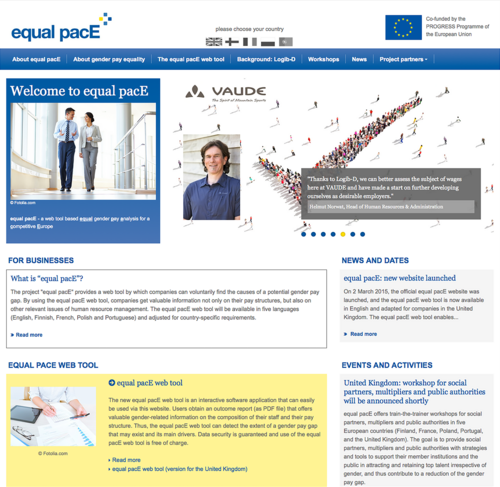In recent years, the issue of gender equality at work and in pay has gained more and more attention among business leaders, representatives of social partner organisations, governmental authorities, and the general public. It is deemed crucial for tackling the challenges arising from demographic change. That is why on 2 March 2015, the official equal pacE website was launched, and the equal pace web tool is now available in English. equal pacE stands for “web tool-based equal gender pay analysis for a competitive Europe”.
A new support for human resource management
The project is aimed at providing and promoting a web tool that enables companies to voluntarily analyse their pay structures in order to detect potential gender pay gaps and their causes. Initially, the web tool will be available in five languages (English, Finnish, French, Polish and Portuguese) and adjusted for country-specific requirements in Finland, France, Poland, Portugal and the United Kingdom. Companies in other European countries are also invited to examine the suitability of the equal pacE web tool for their purposes. The use of the equal pacE web tool is free of charge.
The equal pacE web tool is an interactive software application for identifying the main drivers of gender pay gaps that may exist within a company. It is based on excellent standards developed by state-of-the-art academic research and represents an adjusted version of the established German web tool Logib-D. The results of the equal pacE analyses are presented in clear and transparent outcome reports. These can then serve as a promising starting point for dealing not only with current corporate gender pay gaps, but also with strategic issues in human resource management.
Access to the equal pacE web tool is available via its official website, www.equal-pace.eu. The website provides comprehensive information about the software and its functionalities, capacities and benefits. You can also read about the project partners and learn about the latest equal pay news and upcoming events. The equal pacE web tool enables its users and interested parties to learn about the issue of equal pay, showing them how to detect a potential gender pay gap, how to determine and interpret its extent, and how to identify its drivers.
In order to provide information about the country-adjusted and language-specific versions of the equal pacE web tool and its background, train-the-trainer workshops will be held in each of the following countries: Finland, France, Poland, Portugal and the United Kingdom. These will empower representatives of social partner organisations (in particular employer and business associations) and other multipliers to promote the dissemination of the equal pacE web tool among their members. The workshops will give recommendations for developing initiatives aimed at increasing awareness of equal pay issues, and will indicate how to design and disseminate strategies for dealing with potential gender pay gaps at the company level.
equal pacE will be executed jointly by the Cologne Institute for Economic Research (IW Köln), PMSG PersonalMarkt Services and Roland Berger Strategy Consultants. The project is co-funded by the PROGRESS programme of the European Union and is supported by the associate partner the German Federal Ministry for Family Affairs, Senior Citizens, Women and Youth (BMFSFJ).
More on the topic

German Wage Policy between Inflation and Stagnation: Are Conflicts with the Aims of Monetary Policy Looming?
After the economic and financial crisis of 2008/9, the German labour market soon began to recover, creating scope for a comparatively expansive wage policy.
IW
Orphaned executive chairs in German companies
In 2023, half of the companies in Germany reported increasing problems in filling vacancies for management positions because employees are not aiming for a career. Larger companies are less affected than small companies.
IW
